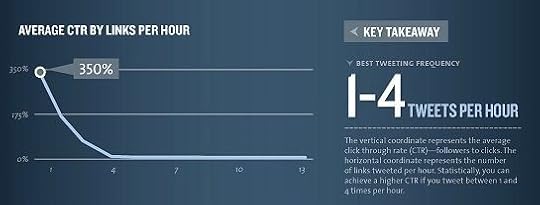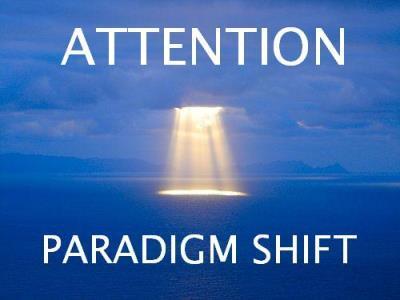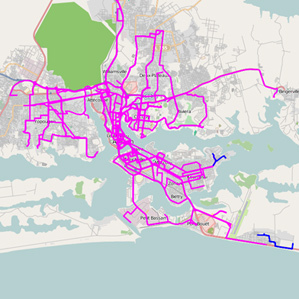Jeremie Averous's Blog, page 132
August 10, 2013
Overcome the Fear of Picking Yourself
Seth Godin says: “The problem isn’t that it’s impossible to pick yourself. The problem is that it’s frightening to pick yourself. It’s far easier to put your future into someone else’s hands than it is to slog your way forward, owning the results as you go“.
 Most people wait to be picked (or to be lucky, which is a variation of it). That’s plain wrong. About all successful people did not wait, they just picked themselves. More in this great Seth’s post.
Most people wait to be picked (or to be lucky, which is a variation of it). That’s plain wrong. About all successful people did not wait, they just picked themselves. More in this great Seth’s post.
Again and again I find that you are what you believe you are. As I need to assert myself as a consultant in situations that are not always easy, I make sure that I act consistently with the identity I want to have. I pick myself for that activity, and I shape my identity accordingly. I am today what I want to become.
What about you? Have you picked yourself? Why wait? Just be what you want to become. Don’t be afraid: the world will bow to your will!

August 8, 2013
Why Reserves are Key to Face Uncertainty
It is a well known fact in military command that Reserves are the key to success in the uncertain world of battle. As exposed by General Vincent Desportes in his book “Decider dans l’Incertitude” (in French), an excellent book about decision-making in uncertain conditions, reserves are the main tool to manage uncertainty.

How often do you run without reserves? Is that wise?
The higher the uncertainty, the more courage the commanding officer must have in increasing the size of its reserves. According to Churchill, engagement of the reserve resources is indeed the utmost responsibility of the one in command (and it often makes the decision in battle).
Jim Collins and Morten Hansen, in the book “Great by Choice“, come to the same conclusion: those organizations that thrive on the long term have a far more conservative view on balance sheet and establishment of financial reserves. They don’t necessarily seek the just-in-time; they don’t over-borrow; they don’t extend themselves too thin, even if they find an opportunity to do so. They make sure they are resilient to uncertainty.
Individually and in our organizations, reserves are important. Even if it means some loss of efficiency, they can make the decision when it comes to the realization of specific, unpredictable situations. Not to mention that reserves gives peace of mind when facing the usual ups and downs. Having some reserves is an important approach I also use in my small start-up even in growth mode.
What about you? Do you have enough reserves to face uncertainty? What about your organization? What will you do about it?

August 6, 2013
Why would “profits without production” be bad?
In a column in the International Herald Tribune “Profits without Production“, Paul Krugman explains how the world is changing and how corporations like Apple is the highest valued company in America and employs only 0.05% of the workforce, to be compared with GM in the 1960′s – also the most valued company in America but employing 1% of the workforce and thus spreading wealth much more through society. And that it is a problem for economic growth because of less redistribution of value throughout the economy.
 Indeed as we defend in this blog, with the Fourth Revolution the value is moving from manufacturing into creativity. For Apple, manufacturing is a (low cost) commodity. The value lies in the creativity, the design and the service; in summary, in the experience. Marketing then takes care of selling us that experience at the right price – the price we are deady to pay for it.
Indeed as we defend in this blog, with the Fourth Revolution the value is moving from manufacturing into creativity. For Apple, manufacturing is a (low cost) commodity. The value lies in the creativity, the design and the service; in summary, in the experience. Marketing then takes care of selling us that experience at the right price – the price we are deady to pay for it.
Yes, we have a problem now of large corporations not reinvesting in the economy their huge profits; yes, we have a problem of the share of employee compensation shrinking compared to executives’ and shareholders compensation, thus slowing down consumption and growth. Yes, we have a problem of monopolies being created in new economic arenas that will need to be tackled.
However it serves nothing to complain that value is moving from tangible manufacturing into intangible creation. It is the sense of history. What we need to do is to find solutions so that this shift is accompanied by an appropriate balance in the distribution of value throughout society. We have not found the recipe yet but let’s continue to experiment and observe!

August 3, 2013
Launching the Innovation Renaissance, About the Law of Diminishing Innovation
Alex Tabarrok is economist and has written a short essay on ‘Launching the Innovation Renaissance‘. In this highly recommended book he analyses the current issues related to innovation – such as patents, education system and corporate rewards.

The Tabarrok curve of decreased innovation when patent protection exceeds a certain level
Alex Tabarrok is also known for the Tabarrok curve of decreasing innovation when patent protection increases beyond a certain level. Not dissimilar to the Laffer curve of diminishing tax returns when the tax burden increases!
His view on patents and how the increase in patent protection in the 1990′s in the US, in particular in the field of software patentability, is actually diminishing innovation instead of fostering it, is very interesting, and quite aligned with what we exposed in some early blog posts such as ‘How patent litigation cost half a trillion dollar inefficiency in the last 20 years!‘
It is quite a short book, very easy to read, and to the point. One small issue though is that it is very US-focused and would gain to be broadened more globally looking at the innovation issues world-wide. Issues are not the same everywhere, but at the end of the day innovation does benefit everybody.
Add it to your summer reading list!

August 1, 2013
How to resist the increased immediacy of our world!
We live in a world of ever increasing immediacy. This tends to change significantly the way we behave. We can’t spend a few minutes without watching our devices!
In social networks, our posting history is soon unavailable, after a few days at most. It is difficult to search for past posts. Even in the case of emails, data shows that people tend to forget ever sooner those emails that are not on the top of the pile (see “Is Email Open Rate Decay Increasing?” blog post by Christopher S. Penn). A reason might be increase in the use of mobile devices with a much more limited screen and usability of scrolling down!

Curve showing optimal twitter frequency for marketing (from marketingsavant.com)
The curve above suggests that for marketing purpose, tweets should be sent many times per hour!
In the same time, tools that allow to read content in an asynchronous manner like Google Reader are being discontinued by their producers.
So, are we supposed to be permanently hooked up to our devices so as to not miss the latest update or news? Isn’t it a conscious strategy by marketers to push us to remain hooked in front of our tiny screens? Does that really correspond to a need?
Every time I disconnect, or I stay in a situation where I can only connect once a day or so, like during holiday time, I feel like it is enough. Not so much changed in the meantime.
One of the skills in the Collaborative Age will be the ability to manage time. To resist to this behavior expected from us to remain hooked to our social network feed.
Will you use these holidays to get off the hook and disconnect for a while? Practice your time consciousness?

July 30, 2013
How a Paradigm Shift is Happening in Management
Forbes maintains an interesting column by Steve Denning about the paradigm shift in management.
 Steve Denning believes that there is a deep change happening right now, from a shareholder-driven organization towards a customer-centered organization (read: ‘Don’t Diss The Paradigm Shift In Management: It’s Happening!’). According to him, this will require change from a bureaucratic organization towards new management models that are more flexible, agile, and customer-focused. As readers of this blog you’ll know I even believe the change is much more fundamental as it is related to customer collaboration, nevertheless Steve Denning’s view is quite useful for organizations nowadays.
Steve Denning believes that there is a deep change happening right now, from a shareholder-driven organization towards a customer-centered organization (read: ‘Don’t Diss The Paradigm Shift In Management: It’s Happening!’). According to him, this will require change from a bureaucratic organization towards new management models that are more flexible, agile, and customer-focused. As readers of this blog you’ll know I even believe the change is much more fundamental as it is related to customer collaboration, nevertheless Steve Denning’s view is quite useful for organizations nowadays.
As with all paradigm shifts it will be tough and take time – read his excellent column comparing that change to the Copernican revolution – ‘Why The Paradigm Shift In Management Is So Difficult‘. This is entirely applicable to the Fourth Revolution changes.
A paradigm shift is certainly happening, that will take time to be realized by all those that are still in the Industrial Age mindset. Be a Fourth Revolution precursor and see how the new approach of business has the power to change the world!

July 27, 2013
Witness the change on our planet. How will it change our view on our Environment?
Have you heard about Google Earth Engine Timelapse? The Google team has layered satellite imagery of earth over several decades (generally back to the early 1980′s). This shows how landscapes have been changed over the time.

How the Columbia Glacier has retreated over three decades
You can for example look at how the Dubai coast has changed, or how the Columbia Glacier has retreated over three decades.
You can even look at your hometown change by scrolling on the world map and zooming on your favorite place!
Simply awesome – remember that the first TV image of earth dates back only to 1960!
I strongly believe that our environmental mind has significantly changed the day we’ve seen pictures of our blue planet floating in a dark void in the 1960′s. Will this initiative further create a small revolution in our perception of our environment?

July 25, 2013
How anonymous mobile data redraws bus routes in Africa
A research project has demonstrated that bus routes could be mapped in Abidjan by just following anonymously the signal from the users’ handphones. Bus routes in third world countries are notoriously not centrally managed and operated by a large number of autonomous parties.

Abidjan bus route map inferred from mobile phone position data
This mapping allows city planners to get an up-to-date picture of the situation and take action to improve the current situation or take other actions related to improving the traffic condition.
According to this research done by IBM, actions could be taken to slash commute time by more than 10%! (more on this in this BBC post).
Using available data that way, through the unaware collaboration of millions of commuters, is an effective way to create value for the community. How much of this would have been possible even 5 years ago?

July 23, 2013
Are You Ready for the Impact of Government Open Data?
“Information is a valuable national asset whose value is multiplied when it is made easily accessible to the public“.
 Early May, President Obama released historical new rules for US government Open Data: from now on, data generated by the US government is to be made available in open, machine-readable formats. A new portal is setup to make the data available to those that want to use it to enhance its use.
Early May, President Obama released historical new rules for US government Open Data: from now on, data generated by the US government is to be made available in open, machine-readable formats. A new portal is setup to make the data available to those that want to use it to enhance its use.
To clarify the impact of that decision and how it will change things for the citizen, this excellent paper by the Canadian David Eaves, an eager supporter of Open Data, gives further insights: ‘Thoughts on the White House Executive Order on Open Data‘
No doubt that this US initiative will span similar initiatives in a number of other countries. Crowdsourcing the usage of government data to create meaningful information is in its infancy. Watch as incredible usage will be made of this data and how it will change public policies for the better!

July 20, 2013
Those Who Matter Won’t Mind You Saying What You Think
“Be who you are and say what you feel because those who mind don’t matter and those who matter won’t mind.” ~ Dr. Seuss

Ready to create a ripple effect?
When you speak your mind, you will disturb. You will disturb the nicely arranged uses, customs and habits that are so easy to repeat without questioning.
That’s a given – you will disturb and the world will try to fight back to stay at the same equilibrium.
As a result, most people avoid creating this disturbance.
Yes, of course, if you say what you really think, most people will object. But not the few ones who matter. And that’s what is really important.
Be certain that the few that won’t object are those that really matter to you. So, just move on and change the world. What are you waiting for?




